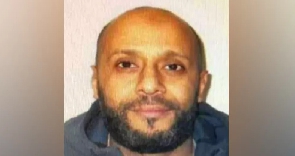 A police handout of the suspect, named in Belgian media as Abdesalem
A police handout of the suspect, named in Belgian media as Abdesalem
A gunman who shot dead two Swedish football fans in Brussels last Monday had escaped from prison in Tunisia.
Belgian prosecutors say Abdesalem Lassoued had been sentenced to 26 years in prison in 2005, reportedly for crimes including attempted murder.
He escaped in 2011, managed to board a small boat and arrived illegally on the Italian island of Lampedusa.
Lassoued eventually moved to Belgium, where he applied for asylum. When rejected, he fell off the radar.
The Tunisian authorities had asked Belgium to return Lassoued home in August 2022. Belgian officials received the extradition request, but failed to process it.
Belgium's Justice Minister Vincent Van Quickenborne resigned on Friday over what he called a "monumental and unacceptable error with dramatic consequences".
On the evening of Monday 16 October, Lassoued, a 45-year-old man from Tunisia, started shooting at passers-by with an assault rifle in central Brussels.
He then chased people into the hallway of an apartment building, where he shot and killed two Swedish football fans, and injured a third. The Islamic State group has claimed responsibility for the attack.
After a manhunt the gunman was tracked down at a cafe near his home in Schaerbeek, northern Brussels, on Tuesday morning. He was shot dead by police.
"I sincerely want to apologise to the victims and their loved ones," Mr Van Quickenborne said during his resignation speech. "I am not looking for any excuses."
He said he wanted to take "political responsibility for this unacceptable mistake".
Brussels public prosecutor Tim De Wolf blamed understaffing in his office for the failure to act on the extradition request.
He said the extradition file had been received in September last year and had probably been forgotten in a file cabinet.
"None of the colleagues involved remember what became of this specific file a year ago. There is no trace of it being handled," he said.
The prosecutor did not mention why Lassoued had been jailed, but Belgian media are reporting that he was imprisoned for two attempted murders.
The attacker had lodged asylum applications in Norway, Sweden, Belgium and Italy.
In 2016, the Italian intelligence services identified him as a radicalised subject and started to monitor him.
It also emerged that Lassoued had served a two-year prison sentence in Sweden for drug trafficking. According to Swedish media, he was arrested in Malmo for possessing 100g (3.5oz) of cocaine.
The attack in Brussels, which resulted in the death of a man in his 70s and a man in his 60s, has shocked Sweden.
"I think this is one of the first times Swedes have been targeted like this because of their nationality," Maja, a dual Swedish-British citizen who lives in Brussels, told the BBC.
Following a string of Quran burnings by anti-Islam activists in Sweden, the government has been warning of a heightened risk to Swedish nationals.
Copies of the Muslim holy book have been burned outside embassies, mosques, and the Swedish parliament.
This has sparked angry reactions in Muslim countries, and in August the terror alert was raised to the second-highest level following threats by Islamic extremists.
"I always thought that having a Swedish passport was such a positive thing," Maja said. "But times have really changed."
The Swedish Security Service, known as Sapo, said it was "working closely with the Belgian authorities".
The shooting is being treated by the Belgian prosecutor as a terrorist attack - and comes at a time of heightened security concerns across Europe linked to the Israel-Hamas war.
Belgium has announced extra security measures in response to last week's attack. The public prosecutor's office in Brussels, federal judicial police and railway police will all get additional staff.
The flow of information between the immigration service, the police and the judiciary will also be strengthened.